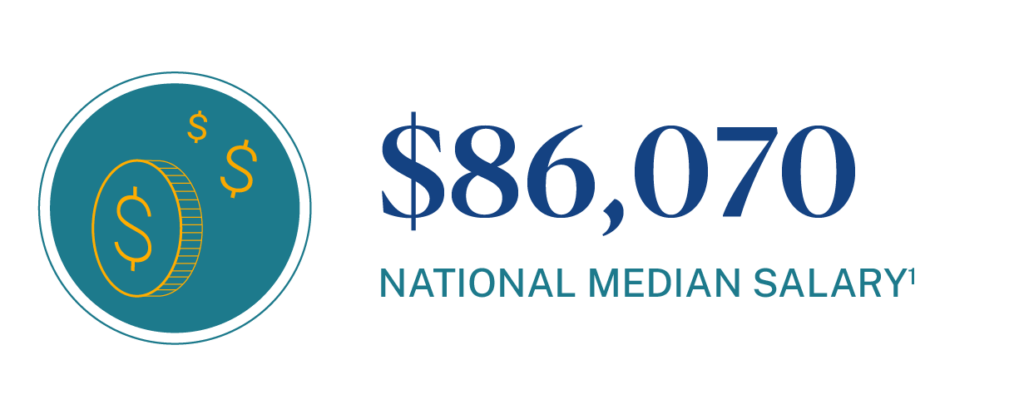Career Guide: Registered Nurse
Overview of a Registered Nurse Career.
Toggle Navigation
What Is a Registered Nurse?
At the frontline of healthcare systems are registered nurses, or RNs, who ensure quality patient care that leads to healing and wellness. As licensed healthcare professionals, they collaborate with providers, administer medical treatment and coordinate patient care. If you’re passionate about caring for patients and guiding them toward healthy living, a nursing career might be right for you.
Registered nurses wear a lot of hats and work in a variety of environments. Their day-to-day responsibilities can differ based on their nursing specialty, but their primary duties include:
- Assessing patient symptoms.
- Creating and executing nursing care plans.
- Preparing and maintaining medical documentation.
- Administering medication.
- Performing diagnostic tests and operating medical equipment.
- Educating patients and their families about illness, injury or wellness management.
RNs are vital in healthcare as they not only provide essential services and patient care, but they advocate for patients and educate them. Their multifaceted roles create welcoming, safe and trusting healthcare environments that generate positive patient outcomes. Further, RNs serve as the meaningful connection between patients and providers. This is your unique career guide to an RN career.
Why Choose a Registered Nurse Career?
A career as an RN is rewarding and full of great benefits. They are often in high demand across the United States as the Bureau of Labor Statistics reported that RN employment is projected to increase faster than average between 2023 and 2033.1 This results in job security, among one of the most significant benefits of an RN career. Many choose to become an RN because they have a meaningful opportunity to make a difference in the lives of others through empathy, compassion and effective care.
Additionally, becoming an RN sets you up for career advancement in nursing. You’ll have the opportunity to grow into roles like charge nurse, nurse educator, nurse director, clinical manager and more. These positions come once you’ve gained nursing experience and continued your education with nursing degrees like a Bachelor of Science in Nursing or a Master of Science in Nursing.
Key Skills and Attributes of Successful Registered Nurses
Successful RNs exercise an extensive array of skills and competencies that result in positive patient outcomes. There are a few key skills that are an absolute must to be a successful RN.
- Compassion and empathy: When patients aren’t at their best, they want to be heard. RNs must be able to listen with compassion and empathy toward patients’ discomfort and distress. This cultivates a safe and trusting environment.
- Critical thinking and decision-making: Critical thinking skills are paramount when receiving patient complaints and determining next steps toward treatment. Combining critical thinking and decision-making allows RNs to best support provider directives and, ultimately, patient outcomes.
- Communication and teamwork skills: RNs not only communicate with patients but also families, providers, insurance carriers and more. This requires effective verbal and written communication skills as well as teamwork. RNs must collaborate with others to appropriately determine and execute medical treatments.
Common Work Environments for Registered Nurses
RNs have the unique opportunity to work in a variety of environments. While several types of healthcare facilities need RNs, we’ll discuss the most common.
- Hospitals and clinics: In hospitals, an RN can work in emergency rooms, operating rooms, intensive care units, inpatient floors, pediatrics and more. In clinics, they can work in general practices or specialties like gastroenterology, oncology, hematology and more.
- Long-term care facilities: RNs are needed in long-term care facilities like nursing homes, rehabilitation centers, assisted living spaces and more.
- Community health settings: RNs serve as advocates and educators, so they are sometimes employed in community or public health settings that need their expertise and healthcare competency.
- Remote and telehealth opportunities: The rise of telehealth amid the COVID-19 global pandemic has since continued to be a significant part of healthcare, and RNs serve in triage capacities and support roles for providers.
Advancement Opportunities as a Registered Nurse
A nursing career path has opportunities for specialization and advanced nursing roles. While there are several, we’ll talk through the most common.
Specializations and Advanced Nursing Career Pathways
A few of the most common RN specializations include:
- Pediatric nurse: Care for children from birth through 18 years old.
- Geriatric nurse: Care for elderly patients in hospitals, nursing homes and rehabilitation centers.
- Critical care nurse: Care for patients who are critically ill, unstable or in need of specialized interventions for potentially life-threatening conditions.
- Emergency department nurse: Care for patients seeking emergency services.
Two of the most common advanced nursing roles include:
- Nurse practitioner: Assess, diagnose, treat and monitor health concerns. Requires advanced education like an MSN and specialty certification and licensure.
- Clinical nurse specialist: Provide direct patient care in a specialized area of nursing. Requires advanced education like an MSN and specialty certification and licensure.
Continuing Education and Professional Development
Continuing education and professional development are essential to a successful nursing career as technology and medical practices evolve. This can involve certifications, continuing professional development programs or even graduate programs like an RN to BSN or RN to MSN program that can lead to an Ed.S. or Ed.D. in Nursing Education.
Challenges and Rewards of a Nursing Career
Nursing can be both a challenging and rewarding career. They are exposed to long hours, changing schedules, emotional involvement, contagious illnesses, chemicals, patient deaths, physical demands and more. However, the ability to lead an individual toward healing and make a difference is among one of the greatest rewards. Nurses are cheerleaders, encouragers and trusted professionals.
Hear from an ACE graduate and RN, Mary Misiunas, to see just how impactful a nursing career can be.
Degree Options for Nursing Careers
American College of Education offers affordable, CCNE-accredited and fully online nursing programs for when you’re ready to take your RN career to the next level with a post-licensure program.
Nursing Career Salary and Job Outlook
Nurses are in high demand in today’s evolving healthcare landscape. Both the salary and job outlook are promising in coming years. Note that salary can sometimes vary depending on state, location and other factors.
Registered Nurse Career Outlook

The median annual salary for RNs is approximately $86,070.1

The U.S. Bureau of Labor Statistics projects over 194,500 RN jobs1 coming available between 2023 and 2033.
MSN Career Outlook

While an MSN serves a variety of roles, the median annual salary is $110,680 for nursing management2, $84,380 for nursing education3 and $129,480 for advanced nursing positions.4

The U.S. Bureau of Labor Statistics projects increased demand in nursing management2 (29%), nursing education3 (8%) and other advanced nursing roles4 (40%) from 2023 to 2033.
Advance Your Nursing Career
The next level of your career is ready when you are. All you have to do is apply now!
